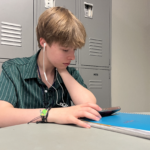The Art of the Pacific Northwest class created this playlist that celebrates artists from the region. When you listen, you will notice similarities in the vibe and aesthetic inherent in the music, a feeling that springs directly from this distinct part of the country where we listen.
The Microphones – “I Felt Your Shape”
This song is short and sweet. Simple vocals over pleasant guitar strumming is a nice break from the rest of this wild album, and each song is packed with many different layers of sounds. It’s a pretty sounding song about misunderstanding someone in a past relationship. I think it’s about admitting you weren’t the right fit for someone, while mourning the loss of that person from your life. I also think he is romanticizing his memories and trying to continue believing that his past relationship was good even though he can clearly see it wasn’t.
Destroyer – “Chinatown”
Destroyer is a Canada-based indie rock band, fronted by Dan Bejar. “Chinatown” is the first song on their album Kaputt. Lyrically, it is a beautiful example of the poetic style and intriguing vocals that are a trademark to the band. The short but sweet verses are ambiguous, and the track could be a movie reference or a breakup song, or simply, as Bejar put it in an interview: “…you find yourself muttering things just to amuse yourself.” The song also contains evidence of their multitude of influences; soft rock and saxophone come together into an odd and enjoyable jazz pop sound. “Chinatown” is a perfect standalone song, but also accompanies Destroyer’s other albums in their creative range.
Modest Mouse – “Teeth Like God’s Shoeshine”
This song is about the commercialization and urbanization of Isaac Brock’s hometown of Issaquah, Washington, and the people bringing these changes with them. The lines: “Let’s all have another Orange Julius / Thick syrup standing in lines / The malls are the soon-to-be ghost towns / Well, so long, farewell, goodbye,” speaks to chain stores and that they will soon be replaced by another. In the lines that the song is named after “Here’s the man with teeth like God’s shoeshine / He sparkles, shimmers, shines,” the writer refers to ingenuine business men running these malls and chain stores. Overall, this song is about selfish businesses profiting off the American people.
Built to Spill – “Car”
“Car” is a sweet, energetic, yet tired song by Built to Spill, an indie rock band based in Boise, Idaho. Doug Martsch is the main writer, vocalist, guitarist and only permanent member. His voice, guitar work and wrenching lyrics have defined the sound of the band since 1992. Their second album, There’s Nothing Wrong with Love, was released just after Martsch’s first child was born. The fourth song on that record, “Car,” captures the album’s vulnerable themes expressed through raw, chaotic indie rock. The lyrics are ambiguous, full of wordplay, odd contradictions and seemingly unconnected thoughts, yet give an incredibly distinct feeling. At times, Martsch sounds as if he is excited to watch someone figure out the world, which could be understood as the musings of a new father. At others, he sounds too tired to follow the listener’s journey. Some phrases give the song a retrospective effect, although much of it is addressing the future.
The New Pornographers – “Twin Cinema”
This song starts the album with a chunky guitar surrounded by a piercing riff that continues throughout the whole track. The band references the name of the song and album through the line “they’ve shown this on both screens” referencing the two (twin) cinemas. There is a quick punchy guitar solo that falls into a more mellow portion. After a few drum fills the chorus booms again. I love how the vocals and guitar interact with each other throughout the song, syncing up in places and then diverging in others. The combination of the two makes the song a good listen.
Beat Happening – “Jamboree”
Beat Happening’s second critically acclaimed album, Jamboree, tells a story of a man who started out with a great life with his significant other, Lori. In the first couple of songs, we hear from him about his life, and how he is happy to be in the position he is in. However, things take a turn: Lori breaks up with him, and he is driven to depression and alcoholism. The title track, “Jamboree,” is only the protagonist, a clicker, and a tambourine. To reflect his mental state, the song feels unpleasant, undone and disorganized. However, in this sloppiness, the listener feels more connected with the protagonist and the struggles he is going through. “Jamboree” makes Jamboree more personal, and makes the listener feel more invested in the story being told.
The Shins – “New Slang”
“New Slang” is The Shins’ top hit, gaining them international recognition and success. It’s a lovely, pleasant listen. Its light tambourine and melodic strumming on acoustic guitar are accompanied beautifully by James Mercer’s vocals. The anger and angst of the lyrics are a sharp contrast to the overall cozy sound of the song. Mercer wrote this song before The Shins even kicked off. He was feeling stuck in the small town of Albuquerque, and hopeless about the future of his musical career. He wrote this song about hoping to escape the mental and physical place he was in. This song was written when he was angry and hopeless but ended up gaining him and his new band international success.
Japandroids – “Adrenaline Nightshift”
This song is about how people wait for their life to begin while missing out on everything going on. It speaks of a longing to be a part of something big without the action to start it. The line “Waiting for a generation’s bonfire to begin,” refers to a generation’s expected uprising that never happens. Instead, the song claims, people find themselves having nothing more to do then enjoying themself, which is where the title “Adrenaline Nightshift” comes from. Overall, “Adrenaline Nightshift” reminds us that if we are waiting for others to be the change we want from the world, it will never happen.
Sunny Day Real Estate – “The Blankets Were the Stairs”
I chose this song because I felt it was the most experimental and interesting on Diary. I really enjoyed the fluctuating calm and storm, and how fluidly the two aspects blended together; it felt incredibly intentional. I took the lyrics of this song to be the singer’s battle between his feelings for a girl and their breakup which he knew was ultimately necessary. He talks about her emotional unavailability with great vocal range and depth, which really adds to the struggling feeling that the song encapsulates. It finishes with a succinct draw off accompanied by the lyrics, “For these things can go on no longer.” Overall, I think this a very thoughtful and engaging song, and that is why it was my favorite on the album.
Bikini Kill – “For Tammy Rae”
This song is the last on the album and gives the listener closure to the story they have been told throughout Pussy Whipped. As the album progresses, the writer tells a story about how she lives with her abuser and yearns for freedom. In this household, she is being taken advantage of and gaslit, all while the outside world is none the wiser. Later, she escapes this household, and meets a girl who she initially calls “Rebel Girl.” She is fascinated with Rebel Girl’s clothes, overall look, and mannerisms, and approaches her in hopes to start a relationship. Rebel Girl turns out to be named Tammy Rae, and Tammy ends up helping her start a new life. For this, the writer shows immense gratitude.
Fleet Foxes – “Meadowlark”
This is one of the most beautiful songs I have heard. It perfectly encapsulates the red-leaf-on-the-forest-floor feeling. The lyrics aren’t all that complex, but yet perfectly add to the song’s beauty. There is a stillness to this song. Listening to this feels the same as taking your hat off on a cold day might, but yet I can also imagine this fitting well on a cool summer night in the country. The imagery that pairs with the beautiful harmonies and acoustic guitar provides such a rich listening experience. This song feels incredibly intentional in its mixing and production, and although it has very simple instrumentation, I couldn’t imagine any other artists making it.
Death Cab for Cutie – “A Lack of Color”
“Lack of Color,” the final track on Transatlanticism, is a slow melancholy tune on an otherwise more upbeat and poppy album. The guitar leads the song and the piano supports the leading guitar with soft chords in the background. No drums, no distortion. Lead singer Ben Gibbard sings about being without a significant other. I’m not sure if he’s talking about a breakup or just a tough long distance relationship, but it’s obvious that whatever it is, it’s painful. He sings about how his world has lost something like in the line “There’s a lack of color here.” He also sings about the regret of not giving this person he’s singing about a “Reason to stay.” This is a very interesting song because in a prior song, “Passenger Seat,” he sings about all the good times he had with this partner. It’s a very somber ending to a very high energy album.





Leave a Reply